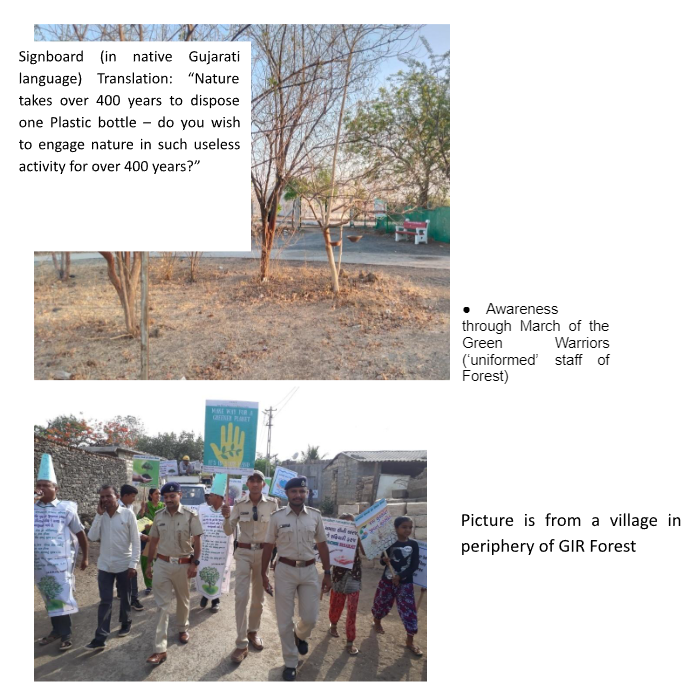WORLD EARTH DAY: A VANTAGE
Blogs Home
- 22 Apr 2024
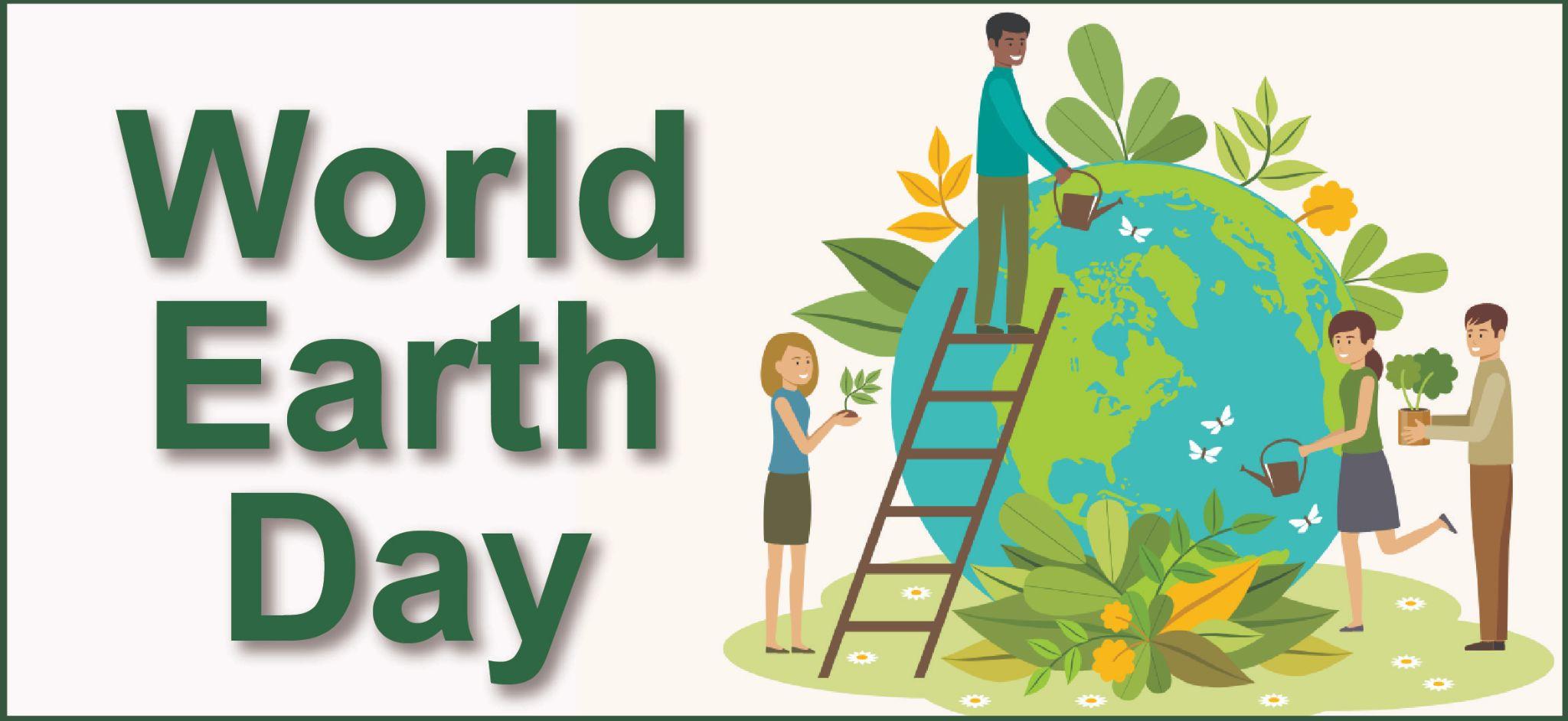
Scheme of this Write-up
| Sr. | TITLE |
| 1 | PERSPECTIVE |
| 2 | Tackling Climate Change: Shared Co-operation or an Obligation? |
| 3 | WORLD EARTH DAY 2024: ‘Planet vs Plastics’ |
| 3.1 | IGNFA CHAPTER:A Success story of battling plastic menace |
| 3.2 | EFFORTS FROM THE FIELD: A Glimpse |
| 4 | Consume with Care: The Way Forward |
PERSPECTIVE
Earth Overshoot Day represents the day of that calendar year when the earth has exhausted its Carbon Budget for the year. In 1970, this day fell on 29th December. Over 50 years now, this date has shifted to 25th July for 2024 implying unequivocally that our growth trajectory is resoundingly UNSUSTAINABLE!
On Occasion of World Earth Day falling on 22nd April every year, let us pause to reflect and ponder upon the state of affairs – indeed affairs of man’s selfish hobnobbing with mother earth which has eventually become his frankenstein’s monster!!
This write-up isn’t intended to load the readers with mundane facts on environment pollution or anthropogenic disturbances to the earth– something which all of us are cognizant about, rather the author aims at presenting a vantage to view the present global climate change and environmental eccentricities as a result of lack of global co-operation in true spirit that turns obligations and commitments a mere sham and that an unbridled consumerism driven by vested interests that has resulted in such state of environment that it is poised to deteriorate if ‘Business as usual’ continues…
Encapsulating his opinion on what should be the way out, the author deals at length on the theme for World Earth Day 2024’s theme ‘Planet vs Plastics’, in which he presents examples from his own field experiences as well as the details of the initiatives at his professional training academy IGNFA to make it plastic-free.
Thus, the author tries to present his dispassionate views, strictly in personal capacity, on the way forward to tackle climate change with solutions ranging from a global discourse to individual actions that would augment the ‘liveability’ of Earth not just for humans but for all sentient beings.
Tackling Climate Change: Shared Co-operation or an Obligation?
Melting Ice glaciers; rising sea levels; alarming Surge in green house gases; Spread of endemic diseases; extremities of nature with hurricanes, floods, earthquakes etc. intensifying both in frequency and magnitude; plummeting count of pollinators; change in the migration pattern of animals and flowering seasons of plants, fear of Submergence of the low-lying countries, alarming extinction of species and rate of global warming…
The above narration is a true and a grim pointer to the global Climate change and its overwhelming effect on entire earth.
As we seek to reverse this picture of making the planet 'liveable' - for all species and not just mankind, for returning the mother earth its natural regeneration potential, for averting the environmental extremities, for undoing the harm we did to mother nature and anthropogenically speaking for our own survival – we seek for solutions to the global climate change problems and given the rampant climate change we need to show exigencies in our approach.
In context of the climate change negotiations, given the ongoing global environmental discourse, wherein the developed nations harp on shared responsibilities while the developing nations scowl on this notion, viewing it as antithetical to their development and crying aloud the ‘Historical Responsibility’ of the former, it is then a vital question, that should we seek to co-operate with each other and in the process strive for equity in sharing the burden of climate change or should it be an obligation imposed on every individual entity?
As Shri Jawaharlal Nehru remarked “The only alternative to co-existence is Co-destruction."
With Cooperation, we gain synergy in our approach(es) for it’s a participatory approach wherein everyone contributes at his own will, acts responsibly and is driven by his 'inner voice' for contribution while an obligation is often imposition of a world view that is duressed upon the actors and hence is viewed as antithetical to individual/ societal/national liberty.
So, then is cooperation the only way out?
Perhaps when we say a resounding YES to the above question, we take a romanticised vision of the world in which cooperation is the norm and everyone does so willingly. But, what we overlook is that mere harp of cooperation with no obligation can probably turn out to be an idealistic prattle because the Climate change needs an immediate attention by people, Societies and nations across the globe.
When there is no obligation, in true sense it renders 'Business as usual" i.e., the "Continuation of State of affairs', which is responsible for the very climate change because the global climatic problem is largely anthropogenic. While we need to have a 'moral obligation' but even this could be taken for granted for we as humans love ‘ease’. So, it is prudent that some mechanisms be designed to ensure cooperation with necessary obligations too and these mechanisms are needed at all level.
In the past, the club Of Rome came out with its report "Limits to growth" (1972) that highlighted how human economic development, driven by his material needs, is deteriorating environment and how climate change could 'backlash' on this human' growth. The Brundtland Commission's ‘Our Common Future’ decried similar situation. Both these impressed upon the need for cooperation between the nations. The Paris Climate Conference Conference of Parties (COP) 21 is considered as significant because for the first time all nations assumed responsibility for climate change overcoming the previous harp on 'historic responsibility of developed nations The new 'mantra' that emerged is: Common but Differentiated Responsibilities – Respective Capabilities (CBDR-RC).
Also, nations submitted their voluntarily determined INDCS (Intended Nationally determined Contributions) to climate change. Hence, it was a bottom-up approach with no obligation on the member States. The developed nations also pledged to give financial aid for adoption and resilience to climate change of the developing nations so the conference strongly pushed for Cooperation' as solution for climate change.
Yet, the flip side is that even if all the nations fulfil their INDCS, they would still be adding around 700-800 Giga tonnes of CO2 by 2030 and this is grossly insufficient, given the fact that the earth's Carbon budget is just 1000 gtonnes of CO₂ equivalent to prevent a global rise of temperature by 2°C above the pre-industrial level by the end of 21st century. This 2°C rise is considered the ‘tipping point’ for unleashing global Climate uncertainties and extremities.
Even if the INDCs are not met, the same would have practically no penalization effect because it is not legally obligated. Successive COPs (Conference of Parties) under the UNFCCC (United Nations Framework Convention on Climate Change) have been even more lacklustre with little actualisation on Ground. Key sticky point is the Funding by developed nations – not just its mechanisms but more importantly, the intent and the commitment of the developed nations to do so?
UNFCCC, under whose aegis COP has met over 28 times now, still can’t boast of much success. For instance, ‘Loss and Damage’ clause since Warsaw mechanism hasn’t seen much success, Adaptation fund didn’t witness a substantial fraction of the commitment given out by developed nations, funding arrangements like GCF (Global Climate Fund), GEF (Global Environment Facility), SCCF (Special Climate Change Fund), Least developed Countries fund etc. – all have fell short of their expectations. Moreover, the system is still runs on the distinction of Annex I and Annex II country parties – something that was defined at the very outset of the UNFCCC. Certainly, over time, the situation has altered, and there has also been a shift in the contribution to warming by the country parties in question.
Similarly, the CMP (Conference of the Parties Serving as the Meeting of the Parties to the Kyoto Protocol (CMP), Conference of the Parties serving as the Meeting of the Parties to the Paris Agreement (CMA) or the Ad-Hoc Working Group of the Paris agreement and other Subsidiary bodies of the UNFCCC like the Subsidiary Body for Scientific and Technological Advice (SBSTA) and Subsidiary Body for Implementation (SBI) – all have had tangibly little success.
It is noteworthy here that no legal bindings and mere “Consensus-based” decision making has resulted in nothing concrete on ground – again a grim reminder that without obligation, climate change negotiations may be nothing more than a lip service!
Is this the urgency' that we ought to display?
Climate change is an ongoing harsh reality, whose effects shall only get exacerbated with time. Probably beneath the veneer of Cooperation we overlook our natural, moral, economical, ethical and Survival obligation. Hence, while cooperation is certainly needed some obligation (s) must also be put forth. If a nation is unable to meet those obligations, others should Cooperate and hence aid them in fulfilling the obligations.
Now,
If we examine at each of the individual, societal, national and global level, there is no dearth of good practices wherein:
At the individual level, we must adopt less energy-intensive and more sustainable lifestyles. Car Pooling, abstaining from heavy, luxurious vehicles (more polluting), energy saving habits must be adopted.
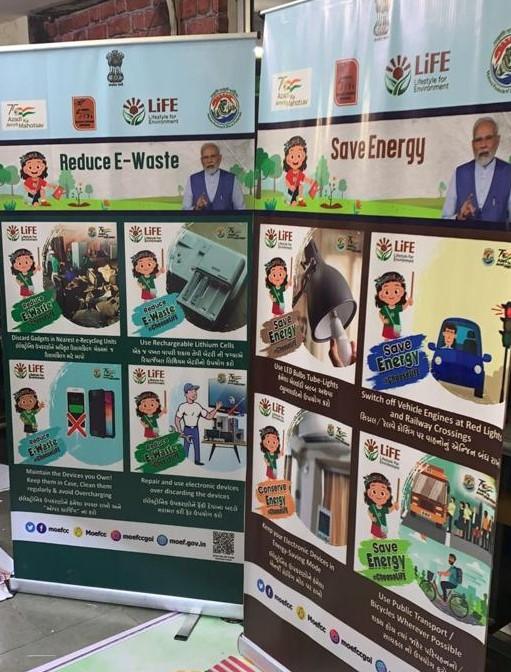 |
.jpg) |
.jpg) |
.jpg) |
MISSION LIFE: A Flagship Programme that aims at making our lifestyle more sustainable. In display are some of the retractable banners that we displayed at different programmes (including cycle rallies-captioned) conducted under this program.
At Societal Level: Massive afforestation drives can be taken, awareness campaign to appeal to individuals, roof–top rainwater harvesting, community kitchen based on Solar or other renewable energy (as in Auroville), pooling of resources to install renewable energy Plants (as in many Spanish villages & Danish Communities - that generate their own electricity) etc. These are good examples of 'Cooperation' between the individuals in a society and societies in a nation. Similarly, the Chipko movement of Uttarakhand and Appiko movement of Karnataka were successful because people cooperated for the cause of environment.
At National Level: The Right Policy Focus like emphasis on Renewable energy like in Germany, the ongoing Energiewende Project promotes roof-top Solar panels installed on houses and today not only people are able to meet their own energy needs but also generate surplus to ship it back to the electricity grid or in Costa Rica which is indeed a ‘poster boy’ nation for the renewables - for several years now, the nation runs on entirely renewable energy for an average of around 300 days per year - can be cited as apt examples.
At International level, we have had only a handful of Successful agreements like the Montreal Protocol –for preventing Ozone layer depletion: With universal ratification and a time-bound binding framework, the Montreal Protocol has been largely successful in setting out to achieving its mission of reversing the damage done to the ozone layer. Efforts have also been made in promoting renewable like the India-led International Solar Alliance or the International Renewable Energy Agency.
However, the success of all these measurers whether at the societal or at the international level, could only be actualised when every individual and nation at large feel the obligation: the obligation for responsibility, obligation for justice to all living beings, obligation of a Civic Sense and a duty towards the environment and obligation for Common good…
The past few years have been the among the warmest our Earth has ever witnessed leading to climate extremes, food insecurities due to vagaries of rainfall, spread of disease-causing vectors, led to scarcity of clean drinking water triggering Climate-change led human displacement and over a score of animal and plant species get extinct daily and like at the outset of this article’s narration, this list can go ad nauseam thanks to the anthropologically triggered domino effect of vicious impact on our environment.
Isn’t it high time that we Co-operate under not just our moral obligation to ‘mother nature and its creations’, but also to our own bonafide interest of survival??
Theme for this year’s Earth day unequivocally underlines the threat that plastics pose to mother earth. This theme is in line with the UNEA’s (United Nations Environment Assembly) latest resolution that sets stage for a legally binding treaty by 2024 to prevent and abate global plastic pollution. Earthday.org, the organiser of Earth day makes a clarion call to curtail plastic production by at least 60% by 2040.
While the harms of plastics are well-known to everyone, the magnitude of this problem can be gauzed through some quick facts:
- 2019 UN Report: Around 1mn Plastic Drinking bottles are produced per minute and up to 5trillion single-use plastic bags annually
- As per United Nations Environment Program (UNEP): Ocean gets clogged with 9mn tonnes of plastic annually while water bodies act as Conveyor belts for plastic debris carrying more than 90% plastic waste.
- Every day approximately 8 million pieces of plastic pollution find their way into our oceans
- Plastic emits Methane when exposed to Solar Irradiation and as per a 2018 study, twice more the amount when it degrades in water
Vicious impact of plastics is particularly observed in water bodies as marine plastics gets trapped in the Ocean gyres leading to, inter alia,
- Bioaccumulation
- Threat to Biodiversity
- Leaching of Harmful Chemical
- Micro plastics: Surface to attach » Vector borne diseases
Some Notable measures taken internationally to curb the plastic menace:
- UN environment's #Clean Seas Campaign
- Blue Flag Beach Certification (ex. Chandrabhaga Beach in India)
- Honolulu Strategy: global effort to reduce the ecological, human health, and economic impacts of marine debris
- G20 framework on marine plastic litter
- UN led Clean seas campaign launched in 2017- fight against Marine Pollution Litter
- Washington Declaration on Protection of Marine Environment from land-based activities
- Ocean Cleanup (NGO) Project on Great pacific Garbage Patch
Nationally, we have had the Plastic waste management Rules 2016 with subsequent amendments like in 2018. It prescribes a set of measures like minimum thickness of the plastics, use of plastics for road construction or for energy recover, lists the responsibility of different Stakeholders – Urban Local Bodies, Producers, state government and Extended Producer Responsibility– to mention just a few but the enforceability of the same is not beyond the question for example CPCB (Central Pollution Control Board) has repeatedly asked states to submit their respective Action Plans on Systematic disposal of plastic waste but these plans have by and large been a sham at best!
Likewise, India pledged to phase-out all SUP (Single Use Plastics) or Disposable plastics by 2022, which account for 36% of total plastics, the key challenges in their disposal is difficulty and a higher Cost of collection remained bottlenecks in implementation.
While a plethora of legal measures have been taken in the past, plastics owing to their accessibility, affordability, availability and lack of suitable alternatives have persisted them in common usage for instance many states have had to ban plastics multiple times like Uttar Pradesh government reintroduced plastic ban in July, 2018 the third time –clearly indicating the difficulty in enforcing the plastic ban. Similarly, after Plastic ban notified in 2018 by Maharashtra, the state in a couple of years, reported over 3 lakh job loss and over 10,000 crore revenue loss – all of it unequivocally points out to the practical issues in curtailing the plastic usage.
However, as the adage goes “Where there is a will, there is a way”. Sikkim had imposed Plastic ban as early as 1998 and has largely been a successful case study in this regard.
Plastics replacement necessitates finding its alternatives – usage of biodegradable materials like Paper, Reused cotton, Jute and Casein is a way out.
I would specifically like to present the Plastic Free IGNFA Case Study at length to appeal and sensitise the readers on the practical solutions to this problem.
IGNFA CHAPTER: A Success story of battling plastic menace
- Preliminary Survey
- Location/Event specific strategies
- Cleanliness drives and awareness generation activities
- Preliminary Survey
 |
||
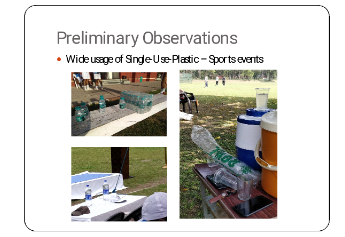 |
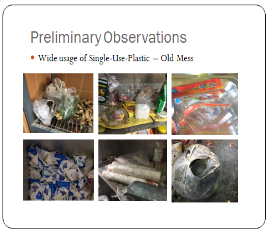 |
 |
Observations on Waste Disposal
- No segregation of waste at source
- Poor interface between waste collectors and waste generators
- Open burning of waste
- Huge potential for composting
Location/Event specific strategies
- At the Mess
- Replaced ½ liter milk packets with 6 liter packs
- Reduced usage of plastic packets from 120 to 10 per day, 40,150 per annum
- Replacement with Milk Cans
- Cloth/Jute bags replaced the plastic covers for procurement of grocery
- Bio-degradable plates, spoons, forks and glasses replaced the plastic ones
- Event Specific Solutions – Annual Sports Meet
- Plastic Cover used for sports kit is collected and returned to the vendor for reuse
- Minimal usage of single-use-plastic bottles – to be phased out in future
- Event Specific – Convocation
- Bouquets: Plastic cover wrappings are replaced with jute wrappings and wood
- Single-use plastic bottles are replaced by multi-use metal bottles
- Cleanliness Drive in and around IGNFA while involving the locals
- Awareness Generation
- Posters
- Stickers
- Folded pamphlets
- Caps and T-shirts for cleanliness drives
- Permanent Wooden Sign Boards that read “ Plastic-Free Zone”
 |
 |
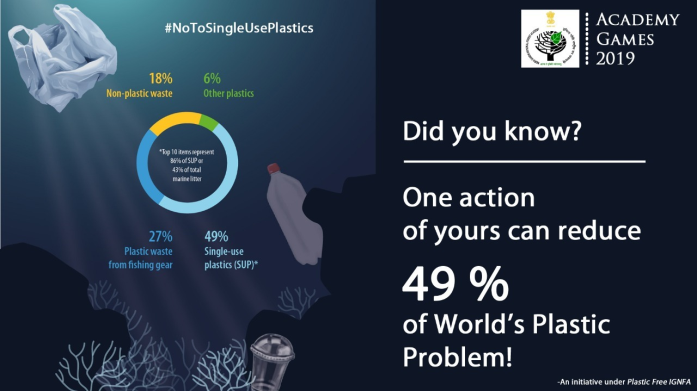 |
|
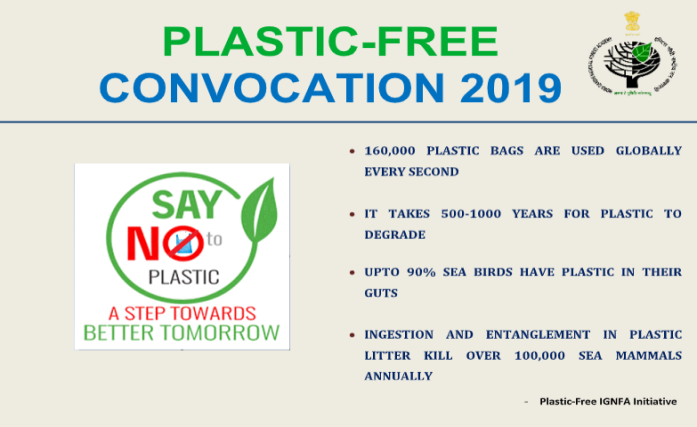 |
 |
| Caption of some Awareness Generations Slogans/Posters |
EFFORTS FROM THE FIELD: A Glimpse
- Signboard in a Public Visitation area at an eco-tourism site of my Botad Social Forestry Division: Effort to sensitize visitors on the abuse that plastic does to the environment
- Under the government’s umbrella programme of Mission Life sensitised communities on Harms of Plastics to Nature.
Hence, the 2024 theme of World Earth Day: “Planet Vs Plastics”, should serve as a clarion call to us to modify our lifestyles to least or no plastic-intensive lifestyle.
Only when it becomes a people’s movement, can plastic menace be tackled for the good to ‘mother earth’.
Consume with Care: The Way Forward
“We do not inherit the earth from our ancestors; we borrow it from our children.”
The above saying finds a resounding eminence today as individuals anthropogenic needs have spiralled to greed and as Mahatma Gandhi aptly remarks: “Nature provides for everyone’s needs not greed”. There is thus, little wonder that unbridled consumerism has crept into our lifestyles pushing mankind into a vicious loop of unsustainability.
UNEP (United Nations Environment Program) had, back in 2015, suggested: ‘Seven billion dreams one planet, consume with care’ – this tangibly sagacious and ostensibly altruistic slogan too speaks volumes on our worldview - While thanks to the Population explosion, the mankind count is today estimated to have already crossed the 8 billion mark, but Seven billion 'dreams because probably mankind, in his selfish pursuit has no unified dream - a dream that views the aspirations of all human beings as essentially the same- Common Good -which emanates sustainability. Importantly, when we say Seven billion dreams this smacks of ANTHROPOCENTICITY because we are probably being insensitive to the needs of the animals, plants and nature at large for our dreams are not just ours, they have a much larger impact. All sentient beings too have a dream – their right to exist on ‘mother earth’ is certainly part of this dream. Hence, we need to ‘Consume with Care’.
Post-Industrialization era witnessed not just a major fillip to the materialistic tendencies among humans but a concomitant degradation of the environment. Rachel Carlson’s ‘The Silent Spring’ has been an early call to humanity to derail from this unsustainable trajectory of what he perceives to be ‘development’.
Factually speaking, Carbon footprint of the USA’s state of Texas is higher than the entire Sub-Saharan Africa combined!
Oxfam’s recent report suggests that the wealthiest 1% of the world’s population produced as much carbon pollution in 2019 as the 5 billion people who made up the poorest two-thirds of humanity!
It is even researched that if each human being develops a lifestyle at par with a US citizen, it would need 8 Earths to sustain it!!
In International Arena, the brunt of Climate Change has been to the maximum detriment of the poor, developing countries- that have historically' less to be blamed for exploitation of nature's resources - the low-lying nations of Bangladesh, Vietnam, Maldives etc. face an eminent threat of submergence with rising sea level; agricultural productivity has already plummeted in the African Sahel region; the spread of deadly Zika virus in Latin America or Ebola virus in West Africa – to inevitably mention a few, herald to the disproportionate harm that has incurred to the developing Countries - worse they don't have enough finances or expertise to be agile enough to adapt to the changes – back to the climate change negotiations!! This vicious loops explains that there is indeed no surprise that (now) the ‘Eight Billion dreams’ of mankind point out to grim inequality in terms of development among them and that in pursuit of vested interests, by and large, humanity falls short of having a unified dream – to break this vicious loop of mindless consumerism, poor environment and inequality – the need to co-operate is thus our obligation as I explained earlier in this write-up…
This draws me to the strikingly correct observation of Paul Polman:
“Climate Change is sometimes misunderstood as being about changes in weather. In reality it is about the changes in our very way of life”.
|
FROM THE FIELD A two-days training on Sustainable Lifestyle Practices was imparted under the Government of India’s EEP (Environment Education Programme) to over a 100 students. Nature turned their classroom as they delightedly hobnobbed with the greens and the woods! |
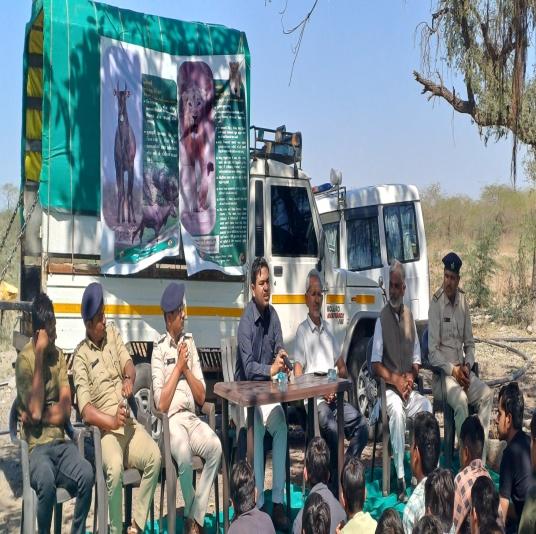 |
 |
 |
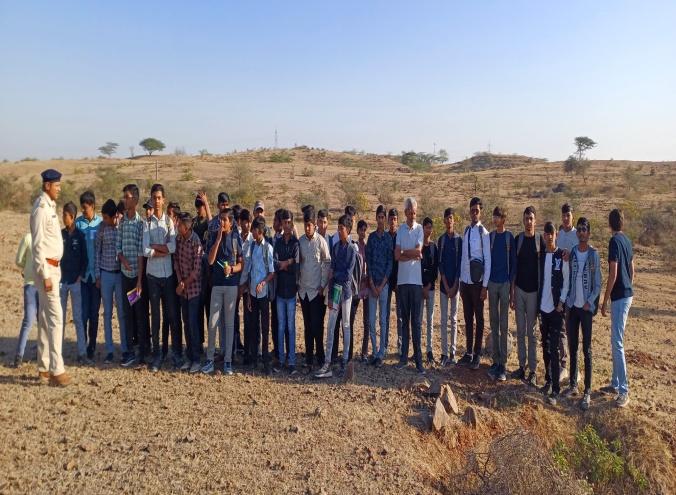 |
Even our cultural ethos, nudge us to understand the prakriti Rna (The debt to nature) and the Manushya Rna (The debt to fellow humans). Hence, ethically, man must be responsible in his outlook towards the resources that ‘mother earth’ offers him.
To conserve and protect wildlife and nature is our Fundamental duty, to preserve our environment is our Directive Principle, to provide for liveable earth is a Sustainable Development Goal (SDG) and to have a right to healthy environment is the ‘right to life' - not just ours but of all living beings: Thus the 'planet'. Hence, ‘Consume with Care' and it begins with looking beyond (now) the Eight billion dreams !!
Today, if we really wish to celebrate the World Earth day in the right earnest, not only do we need to have a holistic and Integrated approach to production processes like Circular Economy but also to have mankind with holistic mindset and a integrated character who know that when they consume with care they allow not just their fellow humans but also fellow sentient like wildlife and nature to fulfil their ‘dreams’ – only then can we pay tribute to ‘mother earth’ in true sense!!
Blogs Home









